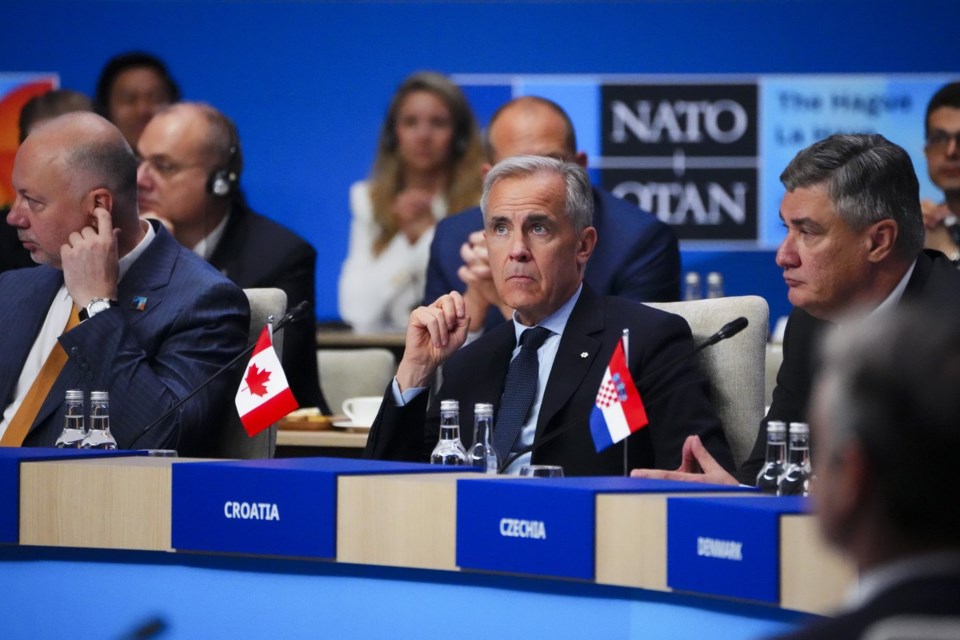THE HAGUE — NATO Secretary-General Mark Rutte said alliance members have agreed to hike their defence-spending target to five per cent of annual GDP by 2035.
As part of the new plan, allies will now have to invest 3.5 per cent in core defence needs such as jets and weapons and 1.5 per cent in defence-adjacent areas like infrastructure and cybersecurity.
The new five per cent target is a massive jump from the previous target of two per cent set in 2014.
Canada's defence spending hasn't reached five per cent of GDP since the 1950s, and hasn't been above two per cent since 1990.
NATO estimates that Canada spent $41 billion in 2024 on defence, or 1.37 per cent of GDP.
Before Wednesday's meeting, Britain, France, the Netherlands and Germany had all committed to the five per cent goal. NATO countries closer to the borders of Ukraine, Russia and its ally Belarus had also pledged to do so.
Some countries, like Spain and Slovakia, expressed concern with the target.
Before the official meeting of the North Atlantic Council, Carney held bilateral meetings with the prime minister of New Zealand, Christopher Luxon, and the prime minister of Estonia, Kristen Michal.
Carney chatted with several leaders in the room, including French President Emmanuel Macron and British Prime Minister Keir Starmer. Foreign Affairs Minister Anita Anand also went over to speak for a couple of minutes with U.S. Defence Secretary Pete Hegseth.
A short video played before Rutte delivered remarks, with all the leaders sitting around a large table. He said the meeting came at a dangerous time, noting the wars in the Middle East and Ukraine. He also said NATO allies stood together and that leaders would take "historic, transformational decisions."
"This decision is deeply rooted in our core mission and is required to resource our plans and readiness," Rutte said. "This will also make NATO fairer, to ensure anyone and everyone contributes their fair share for our security."
Rutte went on to say that "for too long, one ally, the United States, carried too much of the burden of that commitment."
"And that changes today," he said, adding that Trump "made this change possible."
Rutte said the allies would agree to further increase defence production so that its armed forces have "everything they need." He also said decisions include continuing allies' support to Ukraine and called on Russia to "end its aggression."
A Government of Canada news release said Canada and its allies reaffirmed their support for Ukraine at the summit and that the leaders agreed it is imperative to have a just and lasting peace.
Dutch Prime Minister Dick Schoof said Wednesday that NATO allies were "about to write history" by making decisions leading to an "unprecedented increase" in its collective defence spending and a new financial balance in its alliance.
"Both are urgent, both are necessary and both will help make our transatlantic bond even stronger," Schoof said.
Noting the war in Ukraine, Schoof said there is a "renewed awareness" that peace can't be taken for granted and that it needs to be protected.
"And yes, peace comes at a cost," Schoof said, urging members to stand united and "embrace" the plan. "We must act on this swiftly and decisively."
Carney told CNN International on Tuesday that Canada will reach the target in part by developing deposits of critical minerals and that some of the work will be done in partnership with the European Union, EU member states, the U.K. and other allies.
He also said five per cent of GDP would mean a $150-billion defence budget for Canada. NATO said in 2024 Canada spent $41 billion.
All 32 NATO member counties had to agree on a new spending target and had to debate the timeline for its implementation.
Earlier this year, U.S. President Donald Trump suggested the U.S. might abandon its commitments to the alliance if member countries don’t meet their defence spending targets.
The president generated more uncertainty Tuesday when he said his commitment to the mutual defence guarantee in the NATO treaty "depends on your definition" of that guarantee.
Pressed later by reporters, Rutte said he has no doubt about the U.S. commitment to NATO and Article 5, the portion of the NATO treaty which says an armed attack on one member is an attack on all.
Trump, who has long accused the alliance of not paying its fair share toward the cost of its defence, is also the key driver behind the plan to hike members' defence spending target.
At a dinner event with NATO leaders Tuesday, Rutte thanked Trump for pushing for a spending hike and getting Europe to "truly step up."
Kerry Buck, a former Canadian ambassador to NATO, told The Canadian Press that it's in the interests of Canada and European allies to keep the U.S. in NATO as "deep and as long as possible."
"Whatever we can do to get through this NATO summit with few public rifts between the U.S. and other allies on anything, and satisfy a very long-standing U.S. demand to rebalance defence spending, that will be good for Canada because NATO's good for Canada," Buck said.
Rutte warned Monday no country can opt out of the target and that progress made toward the new target will be reviewed in four years.
— With files from The Associated Press
This report by The Canadian Press was first published June 25, 2025.
Catherine Morrison, The Canadian Press



